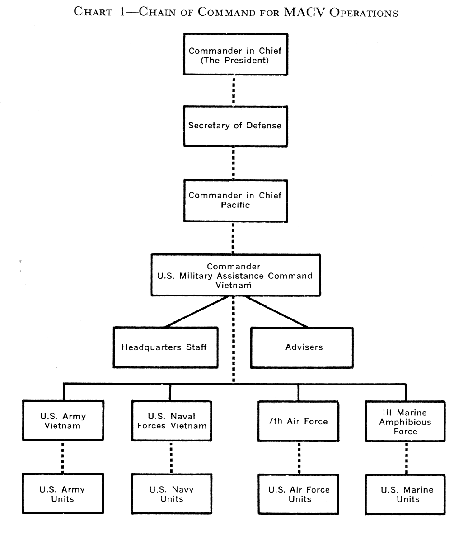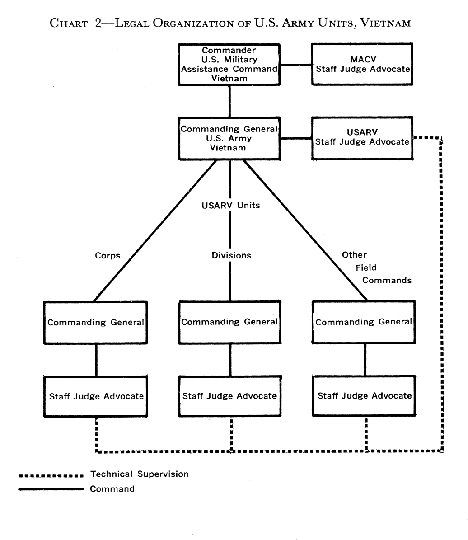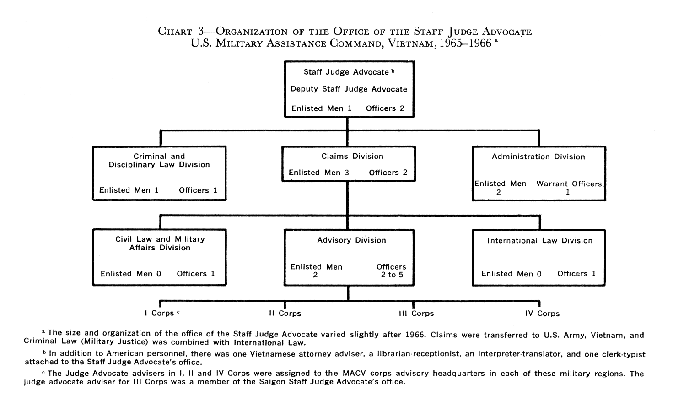
The development of a law firm is dependent on the needs of the firm's major clients. This is true in the Army as well as in civilian practice. The how and why of the organization for legal services in Vietnam, then, is more readily understood by first examining the major military client in Vietnam-the U.S. Military Assistance Command, Vietnam.
In August 1950 the United States sent a small military staff to Vietnam to assist the French in teaching Vietnam forces the use and maintenance of U.S. military equipment furnished under the Mutual Defense Assistance Act of 1949. Chiefly technicians, these advisers were not organized in regular military units but functioned as an extension of the U.S. diplomatic mission in Saigon to which they were assigned. By 1953 the United States had between two and three hundred military advisers in Vietnam, but no military lawyer had been assigned.
In 1959 the first Staff Judge Advocate, Colonel Paul J. Durbin of the Judge Advocate General's Corps, was assigned for the U.S. Army element of the Military Assistance Advisory Group, Vietnam. The U.S. Military Assistance Command, Vietnam (MACV), was created 8 February 1962. The Military Assistance Command was made directly responsible for the command, control, and logistical support of the steadily increasing number of U.S. military advisers, technicians, and staff personnel who were being assigned to Vietnam.
When the first U.S. Marine and Army infantry units were committed to combat in 1965, the U.S. Military Assistance Command, Vietnam, was serving as an allied headquarters in a major theater of operations in which multinational forces were engaged; an operational headquarters for U.S. Army, Air Force, Navy, and Marine units in combat in Vietnam, where major ground, sea, and air combat operations in Vietnam were planned, authorized, and executed under its command; and an extension of the U.S. diplomatic mission. The Commander, U.S. Military Assistance Command, Vietnam, served as the military member of the U.S. Mission Council for purposes of
co-ordination with the chief of the mission on all matters relating to U.S. military activities in Vietnam. The relationship between the Military Assistance Command and the U.S. Embassy was always very close. The commander met with the U.S. Ambassador and- the highest officials of the government of Vietnam almost daily, and several staff sections of the command, including the Staff Judge Advocate, were in constant contact with officers in the embassy. The U.S. Military Assistance Command also directed the U.S. advisory effort. All U.S. military advisers in Vietnam were assigned to the command and functioned independently of regular U.S. troop units.
The U.S. Military Assistance Command, Vietnam, was a subordinate, unified command under the operational control of the Commander in Chief, Pacific. (Chart 1) Its commander, an Army general, reported directly to the Commander, U.S. Forces, Pacific, a Navy admiral, who in turn reported directly to the Department of Defense. The MACV staff sections and advisory teams consisted of military personnel from each branch of the armed services who were assigned directly to the Military Assistance Command, Vietnam. By 1966 each service component of the command also had a major subordinate headquarters for command and control of the major troop units of that service-U.S. Army, Vietnam, U.S. Naval Forces, Vietnam, the III Marine Amphibious Force, and the 7th Air Force. Each of the service elements was self-sufficient in terms of logistical and administrative support, and all combat, combat support, and service units stationed in Vietnam were assigned to one of the service components.
The organization for legal services in Vietnam paralleled the command structure. The MACV Staff Judge Advocate, an Army colonel, was the legal adviser to the Commander, U.S. Military Assistance Command, Vietnam, and was the senior Army Judge Advocate in Vietnam. The staff of the MACV Staff Judge Advocate, composed of attorneys and clerical personnel from the Army, Navy, and Air Force, provided legal services to the MACV -staff and advised the Vietnamese legal agencies.
This organizational structure existed until the last year of U.S. participation in the war. In November 1972, as part of a consolidation plan for U.S. Military Assistance Command, Vietnam, and U.S. Army, Vietnam, judge advocate resources of both were reorganized as U.S. Army, Vietnam-Military Assistance Command, Vietnam, Support Command. (Chart 2) No change in judge advocate missions or functions resulted, even then, however, and the senior staff judge advocate in Vietnam assumed two roles, legal adviser to the Commander, U.S. Military Assistance Command, Vietnam, and his staff

and senior staff judge advocate for units of U.S. Army, Vietnam. The Office of the Staff Judge Advocate, USARV-MACV Support Command, continued to provide legal services to all Army units during the sixty-day troop withdrawal period established in the Agreement on Ending the War and Restoring Peace in Vietnam.
Each of the service elements of the Military Assistance Command, Vietnam—U.S. Army, Vietnam, 7th Air Force, U.S. Naval Forces, Vietnam, and III Marine Amphibious Force—had corresponding judge advocate support at each level of command. Each major U.S. Army, Vietnam, unit-corps, field force, division, support command, brigade-and major subordinate commands of the other several components had its own judge advocate office capable of providing all necessary legal support for the command.
Like the vast majority of military personnel assigned to Vietnam, judge advocates served a twelve months tour of duty. MACV judge advocates were assigned directly to that headquarters but all other Army judge advocates stationed in Vietnam were initially under the control of U.S. Army, Vietnam, headquarters, from which they could be reassigned thereafter. While conditions in Vietnam differed from those experienced by judge advocates in other parts of the world at that time, the legal services provided by the U.S. Army, Vietnam, judge advocates were basically the same as those supplied on any Army post anywhere in the world-trying courts-martial, advising commanders on military justice procedures and other legal problems, providing legal assistance to all personnel, administering the claims program, writing military affairs opinions, and reviewing staff actions and administrative boards for legal sufficiency.
The year 1965 was a watershed for legal organization in Vietnam, as it was for the entire U.S. military force. During the first few months there were only seven American military lawyers in Vietnam. All were stationed in Saigon. One lawyer each served the Army, Navy, and Air Force components of the U.S. Military Assistance Command, Vietnam; the other four were on General William C. Westmoreland's staff. In early 1965 few courts-martial were tried in Vietnam, and crime was not a serious problem. The U.S. Military Assistance Command was responsible to the Army for the administration of claims for all services. The Staff Judge Advocate advised the embassy on legal matters, and the MACV legal staff enjoyed a good rapport with the Vietnamese legal community. The legal problems concerning taxes, real estate leases, black market activities, foreign claims, and drugs, which were to be of mutual concern to the U.S. Military Assistance Command, the embassy, and the Vietnamese government in later years, had not arisen, or were not yet serious.

Beginning in March 1965 with the rapid buildup of U.S. and allied troop strength, legal work increased considerably and new areas of responsibility were added to the duties of the MACV judge advocates. By mid-1965 the MACV Office of the Staff Judge Advocate had assumed the general form it was to retain for much of the war the Staff Judge Advocate, a Criminal and Disciplinary Law Division, Claims Division, Administrative Division, Civil Law and Military Affairs Division, Advisory Division, and an International Law Division. (Chart 3)
The Staff Judge Advocate was the principal legal adviser to the MACV commander and staff sections on all matters pertaining to law, including U.S. civil and military law, international law, and the laws of Vietnam and neighboring states. (See Appendix A.) He was responsible for command policy, supervision, and control of all military law activities for Headquarters, Military Assistance Command, and commands subordinate to it. He performed for the headquarters all statutory functions required of a staff judge advocate under the Uniform Code of Military justice. He maintained an office of record for foreign agreements entered into by the command. Foreign agreements maintained by the Staff Judge Advocate's office included formal treaties between the U.S. and Vietnam on such matters as agricultural commodities, atomic energy claims, defense, economic and technical co-operation, informational media guarantees, maritime affairs, publications, surplus property, taxation, telecommunication, and trade, as well as informal working arrangements between U.S. field commanders and local Vietnamese authorities. A judge advocate mission peculiar to Vietnam was the Staff Judge Advocate's responsibility for developing and co-ordinating plans and providing advice concerning the role of law and lawyers in counterinsurgency, resources control, and the prosecution of the war. In his advisory capacity the Staff Judge Advocate was the senior military adviser to the Vietnam Directorate of Military justice and to other military legal offices of the Vietnamese armed forces. The primary advisory objectives were the revision, development, and implementation of the Vietnamese code of military justice, the planning, co-ordination, training, and direction of the Vietnamese judge advocates, and the administration of military law and discipline. The Staff Judge Advocate also maintained liaison with and assisted Vietnamese civil legal agencies.
In the early days of the U.S. Military Assistance Command, Vietnam, this division performed the traditional military justice work of

the command, observing the state of discipline and undertaking actions necessary to the functioning of military criminal law. Later the division was combined with the International Law Division. At that time the division's military justice responsibilities consisted of furnishing advice and guidance to judge advocates and to commanders and staffs of subordinate commands in the disposition of disciplinary and criminal matters; keeping the commander and the MACV staff, as well as senior MACV advisers and advisory groups, informed on the state of discipline in the command; and recommending appropriate corrective action as necessary.
The Civil Law and Military Affairs Division advised and assisted the MACV staff and other agencies in such matters as currency control, black market operations, the withdrawal of military privileges from civilian contractor employees, the denial of access to military installations and facilities to U.S. civilians, and determinations of unacceptability for employment under U.S. government contracts. The division acted as liaison with the American Embassy, the U.S. Overseas Mission, the U.S. Agency for International Development, and the consul general on legal matters involving the Military Assistance Command. The division rendered advice on the legal status of, and military jurisdiction over, civilian personnel accompanying the armed forces. It appointed trial observers for U.S. civilians being tried in Vietnamese courts and monitored such cases. It reviewed MACV directives prepared by other staff sections. The division served as legal adviser to the Central Purchasing Agency, Vietnam, and to the Vietnam Regional Exchange, the agency which imported, distributed, stored, and sold all post exchange and base exchange items in Vietnam. In accordance with the terms of the Pentalateral Agreement—a mutual military aid pact signed by the United States with Vietnam, Laos, Cambodia, and France—the division acted to ensure exemption of U.S. agencies and U.S.-invited contractors from import taxes, customs duties, transportation taxes, inspections, and other forms of regulation by the Vietnamese government over imported goods and equipment which would adversely affect the U.S. mission in Vietnam. Finally, the division rendered advice and opinions on real estate matters such as the rent-free use by the United States of property owned by the government of Vietnam, compensation to owners for land appropriated for use as military bases or facilities, commercial leases of property to U.S. governmental agencies (there were over 1,300 such leases in Saigon alone by 1970), and real property disposal.
Although MACV judge advocates had been associating with Vietnamese military and civilian attorneys for several years, the Advisory Division of the MACV Staff Judge Advocate's office was not organized until August 1965. The purpose of the Advisory Division was to continue the advisory work with the Vietnamese that had been carried on in an informal manner by previous judge advocates, and to augment the advisory work in Saigon by sending judge advocate advisers into other regions of South Vietnam. Broadly stated, the mission of the Advisory Division was to improve the effectiveness of the Vietnamese armed forces military law and procedures and to establish a popular military and civilian base for respect for law and order.
The Advisory Division was responsible for acquiring, compiling, analyzing, and reporting on data concerning the functioning of Vietnamese military law and legal institutions, including military courts, military field courts, tribunals, military prisons, jails, detention centers, rehabilitation centers' re-education centers, and the legal activities of the Vietnamese law enforcement agencies as they affected military law. As information was received and evaluated, recommendations were made to the Staff Judge Advocate for improvements believed possible in the Vietnamese military justice system. The division also acquired, translated, cataloged, published, and maintained files of Vietnamese decrees and other laws.
Acting on behalf of the Staff Judge Advocate, the Advisory Division maintained liaison with elements of the Vietnamese civilian legal community such as the Ministry of justice, the civilian courts, and the School of Law, as well as with the Vietnamese armed forces legal service, the Directorate of Military justice. Work with the Directorate of Military justice included advising and assisting Vietnamese judge advocates on technical legal matters on request; reviewing and advising on the Vietnamese judge advocate annual budget request and table of organization and equipment; advising on the operation of and obtaining supplies and equipment for the military courts and prisons; and assisting in improving military justice and other law instruction in the Vietnamese armed forces schools and training centers. As a matter of course, the Advisory Division also assisted the other divisions of the MACV Staff Judge Advocate's office and other MACV staff sections in matters pertaining to Vietnamese law. For example, the chief of the Advisory Division during 1972 and 1973 was a member of a joint General Staff committee composed of representatives of the Military Assistance Command and the Republic of Vietnam armed forces to draft a mobilization law and also to prepare a demobilization study affecting the armed forces of the Republic of Vietnam. The judge advocate field advisers, who
COLONEL GEORGE S. PRUGH,
Staff Judge Advocate, 1964-1966.
(Photograph taken after his promotion to major general.)
at various times were stationed in Hue, Da Nang, Pleiku, Nha Trang, and Can Tho, as well as in Saigon, worked with the Vietnamese judge advocates who administered the military courts and prisons in each of the four corps areas in South Vietnam. The judge advocate field advisers assisted their Vietnamese counterparts in all matters of U.S.-Vietnamese legal relations; established contact with local Vietnamese civilian judges, lawyers, and prosecutors; monitored Vietnamese legal activities in the corps areas and rendered reports on legal conditions in the corps areas to the MACV Judge Advocate in Saigon; and performed as command judge advocates for the MACV advisory units in the corps areas.
The International Law Division reviewed and assisted in drafting and interpreting international agreements between the Commander, U.S. Military Assistance Command, Vietnam, and the Vietnamese armed forces and between the Commander, Military Assistance Command, and Free World forces. This division rendered opinions on international law for the command, including the Law of the Sea, the Geneva Conventions of 1949, and the Laws of War. It maintained files of investigations of alleged war crimes and atrocities committed by or against U.S. military or civilian personnel in Vietnam. It assured that prisoners of war who had been captured by U.S. troops and turned over to the Vietnamese government for detention were being provided the legal rights accorded them by the Geneva Conventions. The International Affairs Division provided instruction to newly assigned MACV personnel in the Geneva Conventions and Code of Conduct.
One significant twist in the development of the role of judge advocates in Vietnam happened in mid-1965 and shaped the functioning of the MACV legal office in a manner not anticipated. It came about through a judge advocate staff study completed on 31 May and designed to explore the role of the civil law system in counterinsurgency operations in Vietnam. The following is quoted from its opening paragraph:
There cannot be a successful counterinsurgency program until there is established a respect for law and order. This can be done with establishment of an effective system of law, law enforcement, and public education in the place of the legal institutions and the citizen's role related to them. This is a long-term goal but it cannot be started after the military effort
is completed. It must be simultaneous with the military operations against the VC and must be stressed in the areas where a sufficient degree of pacification has been attained to permit the legal institutions to function.
Such a program encompasses public education from the grade schools up.
It also means considerable improvement in the efficiency and relationship between the National Police and the court apparatus. It requires com-
There is a particular warning available to us in any civil code country where one or more of the following exist: (1) the law is an engrafted one, passed without local adaptation from a colonial power in relatively recent times; (2) there is no method for the general public to express itself in legal matters, such as through elections of officials or laws; (3) where the legal institutions do not function in the rural areas; or (4) where the bar is too small, intimidated, a "closed shop," or collectively voiceless in the affairs of the government.